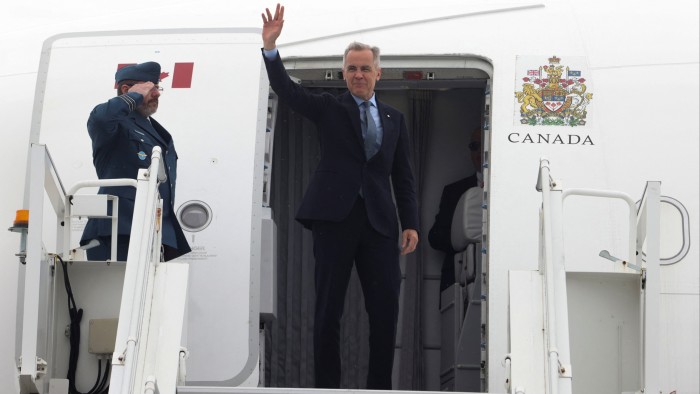Unlock the White House Watch newsletter for free
Your guide to what Trump’s second term means for Washington, business and the world
Mark Carney has had a short honeymoon since his victory in Canada’s election.
A little over a week after spearheading his Liberal party’s comeback, the prime minister will meet US President Donald Trump on Tuesday for crucial talks overshadowed by a looming trade war and rumblings of Brexit-style rebellion at home.
The US president’s hostility to his northern neighbour — with repeated threats to annex Canada and the imposition of tariffs in violation of a free trade agreement — dominated the Canadian election campaign and helped propel Carney’s Liberal party to victory.
The former central bank governor pledged that Trump would “never break” Canada, and said Ottawa would look to forge new trading alliances.
Now he must find a way to repair relations with his country’s biggest trading partner.
“Carney’s certainly going into the lion’s den,” said Dimitry Anastakis, a professor at the University of Toronto’s Rotman School of Management. “It is a delicate operation. During the campaign he said some very strident things about Trump and the US.”
But for all Carney’s fighting talk, the C$1.3tn (US$940bn) annual trading relationship is crucial to his country’s economy. Canada sells most of its products and services to the US.
Despite hopes for a reset in bilateral relations under Carney, Trump said in an interview with NBC on Sunday that he would “always” be talking about making Canada the 51st US state and repeated a list of grievances over the country’s timber, energy and automotive industries.
“We do very little business with Canada. They do all of their business practically with us. They need us. We don’t need them,” he said.
Meanwhile, the prime minister is also facing a challenge from Trump-friendly Alberta premier Danielle Smith, who visited the US president at his Mar-a-Lago residence in January.
In the wake of Carney’s win, she has resurrected the spectre of separation by oil-rich Alberta, tabling electoral reforms to “strengthen democracy” that made it easier for a referendum on independence by halving the required number of signatures for a petition requesting a poll to just 10 per cent of eligible voters.
“The vast majority of these individuals are not fringe voices to be marginalised or vilified . . . They are, quite literally, our friends and neighbours who’ve just had enough of having their livelihoods and prosperity attacked by a hostile federal government,” she said in an online address on Monday evening.
In April, ahead of the election, Angus Reid polling found three out of 10 voters in Alberta and Saskatchewan said they would like to leave Canada if the Liberals formed the next government.
While there has long been dissatisfaction in Canada’s western provinces over governance from Ottawa, which lies thousands of miles to the east, Alberta was an especially vocal critic of the Liberal party and its environmental policies under former prime minister Justin Trudeau.
Although Carney has pivoted away from his predecessor’s approach and has pledged to make Canada an energy “superpower” — with Alberta’s oil and gas sector eyeing huge potential in finding new markets for their fossil fuel reserves — resentment over federal energy policy remains a rich seam for the province’s politicians.
Recommended
After meeting Carney last week, Smith posted on X: “Repairing the damage to Alberta’s economy caused by Ottawa’s last 10 years of anti-resource legislation and policies will take tremendous effort and co-operation.”
Carlo Dade, a senior fellow at the Canada West Foundation think-tank, said while there was a lot of anger and frustration in Alberta, the latest outbreak was not unprecedented.
“Alberta has to work this out with the new government, but am I particularly alarmed looking at the broader swath of Canadian history? I’m thinking this is well within what we’ve dealt with,” he said.
Carney’s task in Washington is a more immediate challenge. As one of the few foreign leaders to stand up to Trump, all eyes will be on his reception at the White House on Tuesday.
“Trump has repeated exaggerated claims about trade deficits, calling them a form of subsidy, so Carney faces a difficult conversation,” said Semra Sevi, a professor of political science at the University of Toronto.
“The last thing [he] wants is a repeat of [Ukraine President Volodymyr] Zelenskyy’s tense visit to the White House.”



